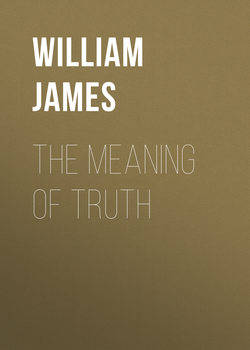The Meaning of Truth

Реклама. ООО «ЛитРес», ИНН: 7719571260.
Оглавление
William James. The Meaning of Truth
I
II
III
IV
V
VI
VII
VIII
IX
X
XI
XII
XIII
XIV
XV
Отрывок из книги
THE TIGERS IN INDIA [Footnote: Extracts from a presidential address before the American Psychological Association, published in the Psychological Review, vol. ii, p. 105 (1895).]
THERE are two ways of knowing things, knowing them immediately or intuitively, and knowing them conceptually or representatively. Altho such things as the white paper before our eyes can be known intuitively, most of the things we know, the tigers now in India, for example, or the scholastic system of philosophy, are known only representatively or symbolically.
.....
I fancy that these changes in the current notions of truth are what originally gave the impulse to Messrs. Dewey's and Schiller's views. The suspicion is in the air nowadays that the superiority of one of our formulas to another may not consist so much in its literal 'objectivity,' as in subjective qualities like its usefulness, its 'elegance' or its congruity with our residual beliefs. Yielding to these suspicions, and generalizing, we fall into something like the humanistic state of mind. Truth we conceive to mean everywhere, not duplication, but addition; not the constructing of inner copies of already complete realities, but rather the collaborating with realities so as to bring about a clearer result. Obviously this state of mind is at first full of vagueness and ambiguity. 'Collaborating' is a vague term; it must at any rate cover conceptions and logical arrangements. 'Clearer' is vaguer still. Truth must bring clear thoughts, as well as clear the way to action. 'Reality' is the vaguest term of all. The only way to test such a programme at all is to apply it to the various types of truth, in the hope of reaching an account that shall be more precise. Any hypothesis that forces such a review upon one has one great merit, even if in the end it prove invalid: it gets us better acquainted with the total subject. To give the theory plenty of 'rope' and see if it hangs itself eventually is better tactics than to choke it off at the outset by abstract accusations of self-contradiction. I think therefore that a decided effort at sympathetic mental play with humanism is the provisional attitude to be recommended to the reader.
When I find myself playing sympathetically with humanism, something like what follows is what I end by conceiving it to mean.
.....